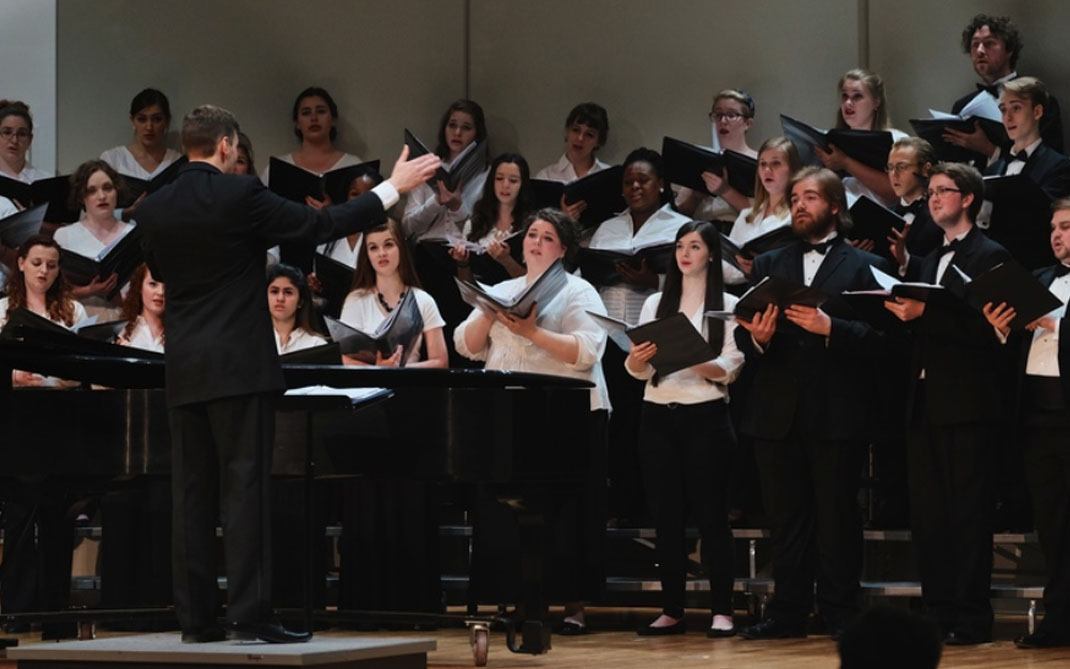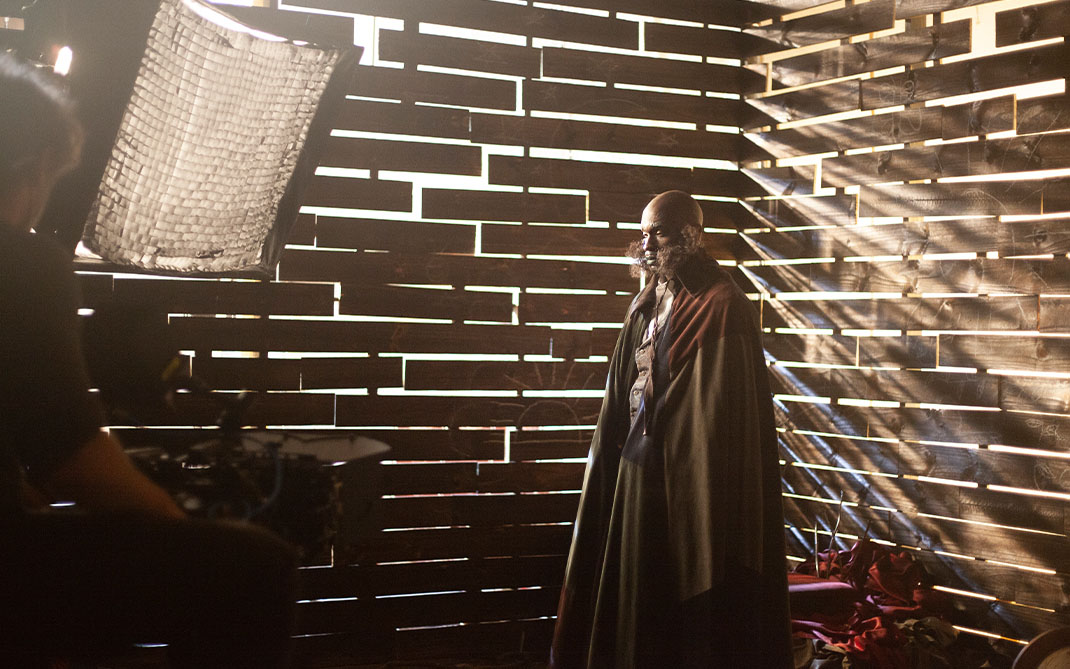Appendix E: University Academic Integrity Policy
Academic Integrity Policy
Originality plays a central role in defining the artist in our time. In classroom,
practicum, studio and workshop settings, artists rely heavily on those creators around
and before them, drawing from these deep wells of inspiration as they develop their
own knowledge, skills, creativity, and technique. Acknowledging the thinkers, creators,
and other innovators on whom our creative production depends indicates our participation
in a creative community, and demonstrates our respect for the artists who came before
us and for creativity itself.
UNCSA is committed to fostering an intellectual, artistic, and ethical environment based on the principles of academic integrity as a critical part of educating artists and citizens. Academic integrity is essential to the success of the University’s mission, and violations of academic integrity constitute offenses against the entire UNCSA community. This Academic Integrity Policy serves as a guide to students as they complete their academic[1] programs of study.
The practices of academic integrity require that a student:
- Properly acknowledge and cite all use of the ideas, words, data, conclusions, artistic products, and craftsmanship of others;
- Properly acknowledge all contributors to a given piece of work in any medium;
- Ensure that all work submitted as his or her own is produced without the aid of unsanctioned materials or unsanctioned collaboration;
- Treat all other students in an ethical manner, respecting their integrity and right to pursue their educational goals without interference, which requires that a student neither facilitate academic dishonesty by others nor obstruct the academic progress of others;
- Uphold the ethical or professional code of the profession for which he or she is preparing.
All that follows in this document builds upon the authority of the UNCSA Student Code of Conduct, which requires students to act ethically and honorably, and which specifically affirms this Academic Integrity Policy.
A. The Academic Integrity Pledge:
All students affirm their commitment to this code in writing upon entering the University and periodically upon request of individual faculty or the institution. This oath is a collaborative effort arising from UNCSA student leadership. This statement should appear where students frequent most, rehearsal spaces, studios, workshops, classrooms, editing suites, student residences and common spaces.
“As a member of the UNCSA community, I affirm the University’s commitment to fostering citizen-artists who act with intellectual and creative integrity and respect for others. I understand that any behavior to the contrary undermines our culture of academic and artistic honor for which we are all responsible.”
B. Administration of the Academic Integrity Policy
- Role of Chancellor and Provost: The Chancellor and Provost have the ultimate responsibility for implementing and overseeing the Academic Integrity Policy
- Role of Deans: Deans shall be responsible for ensuring that students and faculty members receive education concerning academic integrity, and shall advise faculty members concerning academic integrity policies and procedures.
- Role of Faculty Members: Faculty members investigate possible academic integrity violations that take place in courses for which they serve as the instructor of record. The faculty member determines the level at which the charge should be adjudicated, and follows the steps laid out in this document.
- Role of Vice Provost and Dean of Student Affairs: The Vice Provost and Dean of Student Affairs makes the final decision after receiving the recommendation of the Case Resolution Board.
- Role of Director for Student Conduct: The Director for Student Conduct oversees the Student Conduct Process in cases of academic integrity violations, including training the pool of Case Resolution Board members on the details of the Academic Integrity Policy.
- Role of Case Resolution Board: The Case Resolution Board (CRB) hears cases of students accused of separable violations, or nonseparable violations that would be a second-time offense. Case Resolution Boards consist of members of the faculty, staff, and students.
C. Responsibilities for Academic Integrity:
The UNCSA Administration, Faculty, and Students bear responsibility for upholding the highest standards of academic integrity.
- The Chancellor and Office of the Provost are responsible for working with faculty and students to establish equitable and effective policies regarding academic integrity and procedures to deal with allegations of violations of academic integrity.
- The Vice Provost and Dean of Student Affairs is responsible for establishing and overseeing training of the Case Resolution Board, and overseeing the Student Conduct process.
- The Director for Student Conduct is responsible for convening members of the Case Resolution Board pool for Case Resolution Meetings, maintaining files on academic integrity cases, and working with the Vice Provost and Dean of Student Affairs to coordinate training of Case Resolution Board members on the Academic Integrity Policy.
- Dean or a designated Assistant Dean is responsible for ensuring that students and faculty members receive education concerning academic integrity and will advise faculty members concerning academic integrity policies and procedures.
- Faculty members[2] are responsible for modeling and reinforcing the importance of academic integrity within their specific courses and to follow this Academic Integrity Policy when violations occur.
- Students are responsible for abiding by the Academic Integrity Policy in all aspects of their work at the University. Students affirm their commitment to the principles of academic integrity by signing the Academic Integrity Pledge.
D. Definitions
- Academic Integrity: A commitment, even in the face of adversity, to five fundamental values: honesty, trust, fairness, respect, and responsibility. From these values flow principles of behavior that enable academic communities to translate ideals into action.
- Plagiarism: The use of another’s phrases, ideas, images, papers, recorded material, or analysis—copied directly or paraphrased—as one’s own without acknowledging the source in academic work. Among the sources from which attribution is required are: published works such as books, articles, movies, web-based material of any kind, or unpublished works such as other students’ work. Avoid plagiarism by clearly indicating your sources and aids in all work submitted for part of a grade, regardless of the product, source, or degree of aid provided.
- Lying: Giving or affirming false information in any form in connection with academic work.
- Cheating: The use of inappropriate or prohibited materials, information, sources, or aids in any academic exercise. Cheating also includes representing another’s work as one’s own or receiving unauthorized assistance or unauthorized collaboration.
- Facilitation of Dishonesty: Knowingly or negligently allowing one’s work to be used by other students without prior approval of the instructor or otherwise aiding others in committing violations of academic integrity. A student who intentionally facilitates a violation of academic integrity can be considered to be as culpable as the student who receives the impermissible assistance, even if the facilitator does not benefit personally from the violation.
- Academic Sabotage: Deliberately impeding the academic progress of others.
- Multiple Submission: Submitting the same work more than once without all relevant instructors’ permission.
- Violation of Professional or Research Ethics: Includes both violations of the code of ethics specific to a particular profession and infractions of more generally applicable ethical requirements for the acquisition, analysis, and reporting of research data and the preparation and submission of scholarly work for publication.
- Violations Involving Potentially Criminal Activity: Includes theft, fraud, forgery, or distribution of illegally obtained materials committed as part of an act of academic dishonesty.
- Separable Violations: More serious or second violations of the academic integrity policy for which the most severe penalties of suspension and/or expulsion are among the possible outcomes. If a violation is categorized as “separable,” suspension and/or expulsion are not the ONLY possible outcomes, but they are AMONG the possible outcomes. Because a key goal of this policy is to promote a culture of honor and integrity, it can be assumed that ‘separation’ will result in the most serious cases or in cases of repeated, or “serial,” violations.
- Nonseparable Violations: Less serious violations of the academic integrity policy for which possible penalties do not include suspension or expulsion. Nonseparable violations do not carry a possible outcome of suspension or expulsion, whereas Separable violations can result in suspension or expulsion. The individual faculty member is responsible for both the initial classification of an alleged violation and, in the case of nonseparable violations, the determination of a outcome.
- Case Resolution Meeting: A student charged with a separable or nonseparable violation may request a Case Resolution Meeting before a Case Resolution Board specially trained to handle questions of academic integrity. The Case Resolution Meeting occurs before a five-member board with authority to determine responsibility and recommend outcomes. The board includes one member from Student Affairs; one member from the High School Academic Program; one member from any of the Arts Schools other than the Respondent’s; one at-large member randomly selected from the Case Resolution Board pool; and one student representative. Complete information on the Case Resolution Board process may be found in Chapter IV of the Student Handbook.
E. Academic Integrity Outcomes.
The University of North Carolina School of the Arts expects students to respect and abide by the tenets and polices of the Student Code of Conduct. Violations of the Academic Integrity Policy fall into two categories:
- Separable Violations
- Nonseparable Violations
At the time a student appears to be in violation of the Student Code of conduct, any member of the University of North Carolina School of the Arts community is expected to confront the student regarding the behavior and inform the student that the situation will be reported. Any violation of academic integrity is a serious offense and is therefore subject to an appropriate outcome or penalty.
Separable Violations. The classification of “separable” is applied to egregious violations of the Academic Integrity Policy for which possible outcomes include suspension or expulsion. Additionally, if a violation that is originally classified as “nonseparable” is subsequently discovered to be a second time (or greater) violation, it automatically enters adjudication as a “separable” violation. Below are some examples of violations that may be considered separable, though this list should not be considered exhaustive:
- A second instance of a nonseparable violation;
- Having a substitute take an examination;
- Intentionally destroying or obstructing another student’s work;
- Organizing or facilitating a collective act of plagiarism or cheating;
- Violating research or professional ethics;
- Any violation involving potential criminal activity.
A faculty member who observes or is apprised of a possible separable violation of academic integrity by a student shall investigate the matter in a manner consistent with the Student Code of Conduct. If in the faculty member’s judgment a separable violation has occurred, he or she reports the violation to the Dean along with the assembled portfolio of documentation and evidence. If, after consultation with the Dean, the faculty member determines that the violation should be treated as separable, the faculty member delivers the charge to the Director for Student Conduct.
Adjudicating Alleged Separable Violations
- A student may have a friend, advisor or parent come with them to the Case Resolution Meeting. In addition, the Respondent may present witnesses on their behalf at the Case Resolution Meeting.
- The citing party or designee will attend the Case Resolution Meeting and present information.
- The Case Resolution Meeting occurs before a 5-member board with authority to determine responsibility and make a recommendation for outcome.
- Any student charged with an infraction against the Academic Integrity Policy shall be presumed innocent until proven responsible by a preponderance of evidence (“more likely than not”).
- After Case Resolution Meeting testimony, the Case Resolution Board will determine whether the student is responsible and make a recommendation for outcome.
- Assuming that due process was followed, the Case Resolution Board’s recommendation is sent to the Vice Provost and Dean of Student Affairs for the final decision.
- A letter specifying the violation and outcomes will be sent to the student. A copy of the letter will also be sent to the members of the Case Resolution Board, the student’s Arts Dean, the Dean of the Division of Liberal Arts, and the Director of Residence Life Programs and Housing.
Because it is in the best interest of both students and faculty that cases of alleged academic integrity violations be resolved in a timely manner, Case Resolution Meetings will be take place as promptly as possible.
Outcomes for Separable Violations
Outcomes for separable violations include, but are not limited to, one or more of the following, and may, but need not, involve suspension or expulsion:
- Grade of “F” for the course, not alterable via “grade replacement” policy
- Placement on probation
- Denial of access to school sponsored internships, special programs, or opportunities
- Removal of, and ineligibility for, academically based scholarship or fellowship support
- Suspension
- Expulsion
The recommendations for outcomes at each level are not binding but are intended as guidelines for the University community. For both nonseparable and separable violations, the severity of the outcome imposed should be proportional to the severity of the violation committed.
Graduate students will normally receive more severe outcomes than undergraduate students for comparable conduct.
Grounds for Appeals of Separable Violations
In cases of long term suspension or expulsion for separable offenses, a student may request an appeal from the decision of the Vice Provost and Dean of Student Affairs. A student may appeal the decision to the Chancellor or Chancellor’s designee.
Nonseparable Violations
A faculty member who suspects that an academic integrity violation has occurred will investigate, and if the investigation confirms a violation, will propose a outcome. Outcomes may be standard or non-standard, as discussed below.[3]
Investigating and Adjudicating Nonseparable Violations
Faculty members have the authority to determine the appropriate outcome for a nonseparable violation of the Academic Integrity Policy (AIP) in their courses, up to and including assigning a final grade of ‘F’ for the course. A faculty member who suspects a possible nonseparable violation of academic integrity shall proceed to investigate the matter, assembling a portfolio of all materials relevant to the charge. This portfolio should include as many of the following types of documentation as are applicable and reasonably available:
- A copy or description of the original assignment or activity in which the alleged violation took place; original copies of the student’s submitted work;
- Evidence confirming that expectations regarding academic honesty and/or references to the AIP were included on the course syllabus and/or discussed in class;
- In the case of plagiarism or cheating, any documentation of plagiarized sources or other unauthorized aids;
- A narrative account of relevant events leading up to and including the investigation;
- A record/timeline of any communication (oral or written) with the student regarding the case.
It is in the interest of all parties to investigate and adjudicate matters of academic integrity in a timely manner. The faculty member’s initial investigation should be completed as soon as is practical.
After completing these investigatory steps, the faculty member shall do one of the following:
- If the faculty member concludes that no violation has taken place, or that there is insufficient evidence to proceed, the matter is closed without outcome.
- If, in a faculty member’s judgment, a nonseparable violation has taken place, the faculty member should impose a standard outcome of either a “zero” for the assignment or a grade of “F” for the course (unless extenuating circumstances justify a lighter penalty). Before meeting with the student about the alleged violation and outcome, the faculty member consults with the Dean or designated Assistant Dean about the violation and proposed outcome. The Dean or Assistant Dean advises the faculty member, but the faculty member maintains authority over the allegation and proposed outcome. The faculty member will meet with the student to inform them verbally and in writing of the allegation and the proposed outcome within ten (10) days of knowledge of the alleged violation.[4] The faculty member utilizes the form titled “Outcome Form.” It is the faculty member’s responsibility to inform the student verbally and in writing via the official form that they have the right to request a Case Resolution Meeting with the Case Resolution Board. Copies of the form should be provided to the student, the student’s Arts Dean, the Director for Student Conduct, with the faculty member retaining a copy as well.
- In instances when a faculty member judges that a violation has occurred but determines that factors justify a non-standard, reduced outcome (prior to, or following, a consultation with Dean or designated Assistant Dean), the faculty member can simply require a student to repeat or replace the assignment without involving other parties or reporting the violation to the Director for Student Conduct In these cases, the faculty member should meet with the student to inform them verbally and in writing of the allegation and the proposed outcome within ten (10) days of knowledge of the alleged violation (see footnote 3). The faculty member utilizes the form entitled “Repeat Assignment/Replace Assignment.” A copy of the form should be provided to the student, with the faculty member retaining the original. This lowest-level outcome cannot be appealed. The Director for Student Conduct is not notified of the outcome, and therefore it does not become part of the student’s record.
Because it is in the best interest of both students and faculty that cases of alleged academic integrity violations be resolved in a timely manner, Case Resolution Meetings will be take place as promptly as possible.
Outcomes for Nonseparable Violations
Outcomes for nonseparable violations do not include suspension or expulsion.
- Standard outcomes for nonseparable violations should be imposed only after an advisory consultation
with the faculty member’s Dean or designated Assistant Dean. The Dean or Assistant
Dean advises the faculty member, but the faculty member determines the outcome. Following
the consultation, the faculty member can impose one of the standard outcomes, which
include:
- A non-replaceable grade of “zero” on the assignment, and placement of the documentation in the student’s file in the Arts School as well as with the Director for Student Conduct;
- A course grade of “F”, placement on arts probation (see Bulletin), and placement of the documentation in the student’s file in the Arts School as well as with Director for Student Conduct. NOTE: A grade of “F” under this provision is not eligible for removal via the Grade Replacement Policy.
- Non-standard outcomes can be imposed when a faculty member concludes that a violation has occurred
but identifies relevant factors to justify a lighter consequence. A faculty member
may impose a non-standard outcome without prior consultation with the Dean or designated
Assistant Dean. Non-standard outcomes include:
- repeating the same assignment; or
- replacing the assignment with another one.
Violations that lead to non-standard outcomes are NOT placed in the Student’s File in the Arts School nor with the Director for Student Conduct
Grounds for Appeals of Nonseparable Violations:
For suspensions of 10 days or less or nonseparable offenses, appeals are impermissible.
[1] The term “academic,” as it is used in this document, applies to all graded activity, regardless of School or Division. Except in specific instances where it is specifically noted, it applies equally to work in any of the Arts Schools, the HS Academic Program, and the Division of Liberal Arts.
[2]For purposes of the Academic Integrity Policy, the term “faculty member” includes not only full-time, multi-year contract faculty, but also any part-time faculty, staff, or administrator serving as the instructor of record in a course; i.e., the instructor responsible for assigning final course grades.
[3] Individual faculty members, not having knowledge of whether a student has any previous violations on record, will provisionally presume each case is a “first-time offense.” Therefore, faculty members will initially classify a large majority of alleged violations as “nonseparable.”)
[4] If the student is in a distance-learning/online course and does not have face-to-face interaction with the faculty member, the meeting may take place over the phone or video-conference.
Revised August 21, 2016





